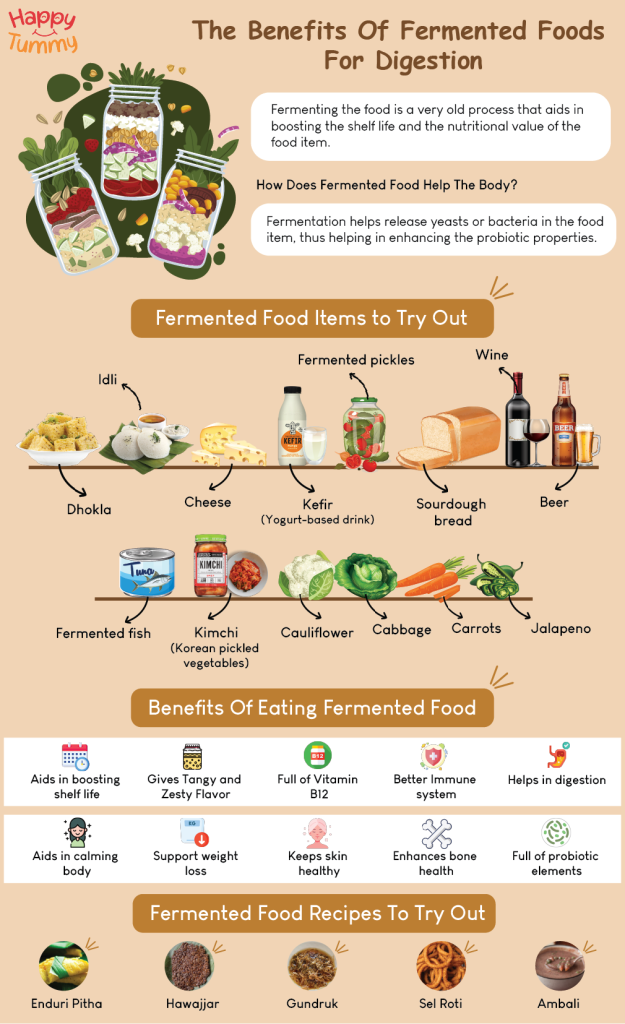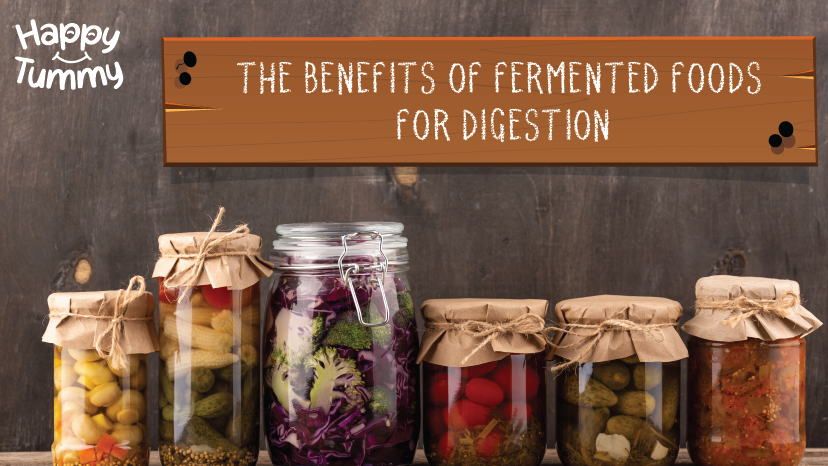Table of Contents
Have you ever wondered what eating out every day does to your health? Or what happens when you eat that big Aloo tikki or chicken burger (fermented foods) equently? Our stomach starts to act funny, isn’t it?
Funny is just an underrated word; in fact, you may start to have many stomach-related problems, one of which is digestion. With people shifting towards junk food, it is time to address how to solve this issue.
When your body cannot digest the food products, you may have digestion problems.
One way through which you can enjoy some tasty, different, yet unique flavors is by eating fermented food. And, for your reference, they are the best to cure all your digestion issues.
Fermentation is not new; people worldwide have been using this method to preserve and conserve food items. Our culture has been using the fermentation method for ages now, and we have an extensive list of food items that one can eat and enjoy. They may take time to be ready for consumption, but once fermentation is completed, you will have a bowl of nutrition ready on your table.
So, let’s talk about everything about fermented foods in this article today.
What Do You Mean By Fermented Foods?
When Microorganisms such as bacteria or yeast convert carbohydrates like sugar and starch into acids or alcohol through a natural process is called fermentation.
Fermenting the food is a very old process that aids in boosting the shelf life and the nutritional value of the food item. It also gives the fermented product a natural tangy or zest flavor. In return, the probiotics within that product aid in digestion.
Now, you cannot imagine keeping cabbage in your kitchen for months, but with the help of fermentation can store it for an extended period.
Moreover, you will also get Vitamin B12 in fermented vegetables, which is not in plant food. [1]
How Does Fermented Food Help The Body?
Fermentation helps release yeasts or bacteria in the food item, thus helping in enhancing the probiotic properties. Your stomach and gut need these properties for healthy digestion.
Once your gut is happy, you will have a happy tummy free of all the digestion problems.
Besides, it is perfect for your children. If you introduce fermented food items early, their bodies will build a better immune system, eventually preventing them from falling sick. [2]
That is why our grandparents always insisted on having dahi during summer. Dahi or curd is also a result of the fermentation of milk, and it helps in cooling your body during hot summer days.
Moreover, if you remember your childhood, your dadi or nani would have always told you to eat homemade dahi whenever you had an upset stomach as it would give instant relief to all digestive problems.
Do All Fermented Food Items Bring The Same Value?
If we say fermentation is good, it does not mean that every item that gets fermented will have the same nutritional value or do the same magic to our bodies.
A certain kind of fermentation may be good in taste but not great for health. For instance, cheese is also a result of fermentation, but a cheese slice may not have the same health benefit as a cup of yogurt.
Yogurt will support your digestion, but the cheese will just add to the taste and flavors of your food.
Different Fermented Food Items to Try Out
Apart from the one that you have been eating your entire life and the one that we have already discussed, below are some more that you can try:
- Fermented vegetables include cabbage, cauliflower, celery, carrot, jalapeno, etc.
- Kefir – Yogurt-based drink
- Kimchi – Korean pickled vegetables
- Fermented pickles
- Fermented fish
- Sourdough bread
- Beer
- Wine
- Salami
- Idli
- Dhokla
- Cheese
These are just a few; you can find more per your taste preference. In fact, you can easily prepare such products at home; some of the common ingredients that can be used are:
- Different food products are prepared using the fermentation of cereals and pulses.
- Curries made using fermenting buttermilk, such as Kadi Pakora.
- Indian sweets are made using fermentation of flour such as Jalebi, Thuktal, etc.
- Dairy products using fermentation of milk.
- Products made from the fermentation of unripe fruits, vegetables, and bamboo shoots.
- The fermentation process is used on meat and other proteins.
Benefits Of Eating Fermented Foods

Here are some of the critical health benefits associated with the fermentation of food:
#1 Fermented Food Makes Digestion Easier
Fermentation’s primary purpose is to break down your food’s nutrients into smaller particles, which helps in easier digestion than unfermented food.
A very simple example is lactose (a kind of natural sugar present in milk) which is difficult for a lot to digest and is broken down into simpler sugar such as glucose, making people easily digest milk or milk products.
That is why lactose intolerant people are unable to drink milk but can consume milk products, thus making your tummy happy tummy.
#2 Fermented Foods Helps To Reduce Anxiety
Through fermentation, certain bacteria are released that are considered very well in calming our body. These properties are only found after fermentation and not otherwise in that particular food item. [3]
Thus, eating a fermented product can help you stay relaxed and calm. That is why eating chocolates makes you feel happy and relaxed.
Yes, chocolate is an excellent example of food prepared using fermentation.
#3 Fermented Foods May Aid In Weight Loss
Fermentation’s probiotic properties make it unique and very effective for our bodies. After fermentation, certain strains are available in the products that help in weight loss and decrease belly fat. [4]
Try eating bread made using Aashirvaad multigrain atta that is fiber-rich and made of six grains such as wheat, soya, oat, psyllium husk, channa, and maize.
#4 Fermented Foods Have Antimicrobial Properties
Most of the products prepared using fermentation have antimicrobial properties supporting digestion, eventually maintaining gut balance. [5]
#5 Fermented Foods Supports Bone Health
Bone health is a must for everyone, especially young children; therefore, offering them milk products created using fermentation will be great.
Such products are rich in calcium, protein, vitamin D, vitamin K2, and phosphorus. These products also help against bone loss deficiency and thus promote bone health.
#6 Fermented Foods May Reduce Inflammation
The fermentation process produces an immune molecule in the food items that may help reduce body inflammation.
#7 Fermented Foods Keeps Skin Healthy
Dairy products prepared using fermentation will be your better choice if you wish to eliminate acne and other skin problems. Consuming such products promotes healthy, beautiful, and young-looking skin.
#9 Fermented Foods Protects Against Toxins
There are specific properties in these products that aid in effectively removing heavy metals known as toxins from your body.
After fermentation, people with gluten allergies can enjoy those products without worrying about their digestive health.
Who Should Eat Fermented Foods?
Fermentation is a natural process, and the food produced is considered safe. But there can be people who may experience some side effects due to the properties present in them.
There can be instances when you may feel bloated or have gas issues. If you undergo such issues, get in touch with your doctor immediately.
Can You Have Fermented Foods Every Day?
There is no specific data on how much-fermented food is right or wrong; it depends on whether your body can consume it and digest it properly.
If you look at the South Indian culture, they consume food products using the fermentation process daily and eat them during breakfast in the form of appam, kallappam, uttapam, etc.
So, if your body can adjust to these food products, you should include them in your family’s diet.
Some Fermented Food Recipes To Try Out
Apart from the dishes and food products mentioned above, here are a few recipes for you to try out and impress your family members:
1. Enduri Pitha
Enduri pitha, a famous dish of Odisha, is prepared during festival items. It is made by fermentation of black gram dal and parboiled rice batter. The batter is later spread on turmeric leaf, steamed, and mainly consumed during winter.
2. Hawajjar
Hawajjar, famous in Manipur, is made by fermenting soybean, an ingredient rich in protein. It requires around three to five days of fermentation, and the result is a sticky and flavorful dish high in protein. You can easily add it to your family’s diet plan and make it shift to natural and healthy eating habits.
3. Gundruk
It is a very easy and simple-to-make fermented dish that you can include as a side dish for dinner or lunch. However, it is from Nepal but is consumed highly in the North-Eastern states of India.
People use green-leafy vegetables such as radish leaves, mustard greens, cauliflower, or any other greens, pound them with little water, and squeeze and pack them in air-tight jars. It takes around a few days to ferment effectively. After fermentation, the leaves are taken out and sundried before use.
Gundruk is rich in calcium, sodium, and potassium, making it perfect for your family.
4. Sel Roti
It is a delicious ring-shaped roti prepared and eaten in Darjeeling and Sikkim. Locally grown rice is used in this dish that is left to be soaked in cold water overnight.
The next day, the soaked rice is pounded and mixed with wheat flour, butter, sugar, and other condiments such as clove, cardamom, and nutmeg.
After adding everything, you will need to knead the dough and leave it for fermentation. Once fermented, let your kids enjoy rotis of different shapes and unique tastes.
5. Ambali
A semi-liquid beverage popular in Southern Indian states such as Tamil Nadu. It is prepared using fermentation of ragi mixed with hot water.
People consume this excellent dish during summer as the fermentation makes it cool in nature. You can even add chopped onions and green chilies as one of the versions of making Ambali.
The Bottom Line
Fermentation is an excellent way of breaking down the carbs present in food and making it easier for people to digest.
Through this process, you will increase the nutritional value of your food item and preserve it for long.
Moreover, if you are bored of eating the same food and want to try it in a different and exciting flavor, ferment it and enjoy its tangy yet flavorful taste.
If you have yet to try fermented food, try anyone listed above or even use some raw vegetables; add oil and a few spices, ferment them as pickles for your everyday use, and carrots are the best.
FAQs
Fermentation of food items helps improve your gut, strengthening your intestines wall and thus helping the digestion system.
Consuming food items prepared using fermentation can help you control your weight while improving your digestion and immunity.
The process of fermentation breaks down the tough particles in the food items into simpler forms. This simpler form is easy to eat and consume, thus, making it easier to digest.
In Indian cuisine, there are many different food items that you can enjoy that are prepared using the fermentation process. Some of the famous ones are – Dosa, Bhatura, and Bhalle, to name a few.
Fermentation is an age-old process that is naturally safe with significantly fewer side effects. Still, people may experience issues such as gas and bloating; if you experience any such, contact your family doctor.
Yes, Jalebi is also made using the fermentation process. It is made by mixing flour and yogurt, which is later kept for fermentation. Later on, the batter is deep-fried and dipped in the sugar syrup.















